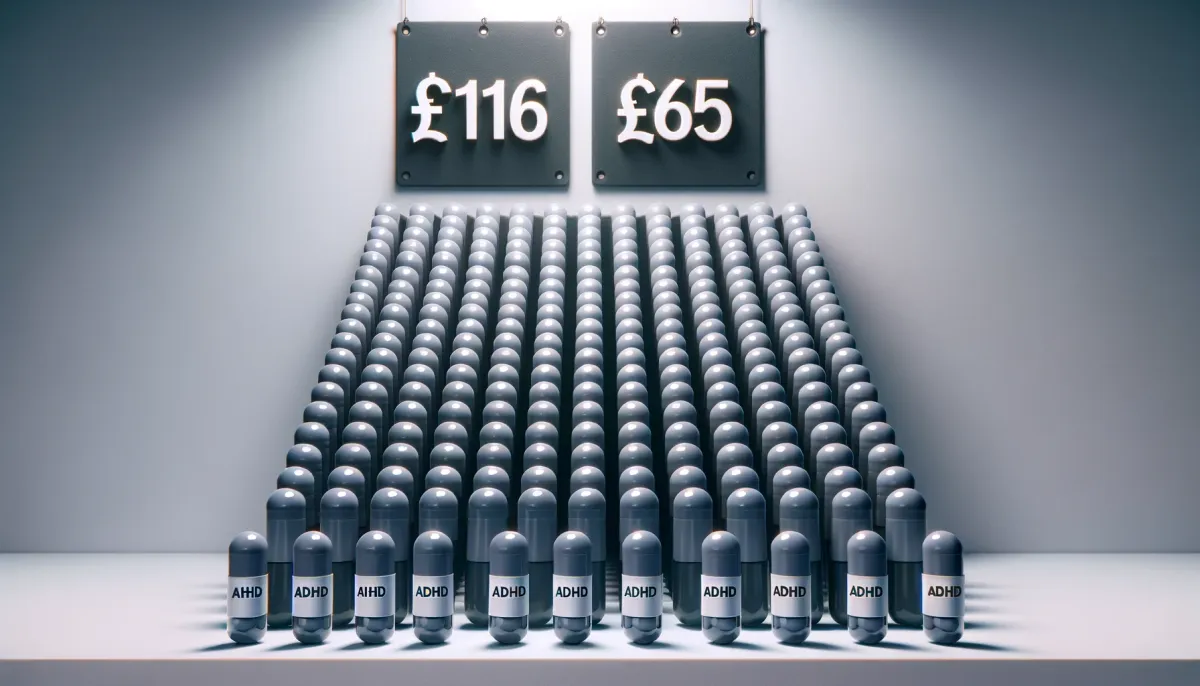Mind the gap: ADHD meds are another postcode lottery
Part One: Price of private prescriptions in Northern Ireland has some pharmacies charging as much as 78% more than others

One of the most common conversations I've had since launching this site is patients paying privately to get an ADHD diagnosis and the associated, hidden costs that follow.
For those who do manage to get a private ADHD diagnosis and are told by their GP that they won't enter into a shared care agreement, there becomes a cost quandary.
Anecdotally, many people who've reached out to me say there's a varying difference in cost for ADHD medication on both a monthly basis and per pharmacy basis. I've spent some time this month to create usable data (am I the only one who always hears two pronunciations every time I type data?). Over a three-part series we'll look at these areas:
- The cost on a per pharmacy basis for a single ADHD medication (this article)
- Historical pricing data (next week) and
- The additional cost (and process) between diagnosis and starting to get prescriptions (coming later in May)
Reaching the 10 per cent
Next week's piece is focused on publicly available data, but for this first article on the variance of pricing per pharmacy, I've had to take a slightly less scientific approach. So please don't look at this as a research study that's been peer reviewed and published in Nature. It's simply one person's attempts to understand a broken system.
The caveats in this mini 'experiment' are that I have focused on one single drug and dose (the one my own psychiatrist has recommended I try for the first month, which is Elvanse 30mg). There's a range of different medications and doses given out and this is just one of them. Equally, this isn't my day job and I don't have the resource to get an answer from all 525 community pharmacies in Northern Ireland.
The details are simple. I called 53 pharmacies and asked for the cost of a month's supply. For those who've been through this, a month is typically enough for 28 days, so in any given calendar year that's 13 prescriptions. For any calculations mentioned here on a yearly basis we're talking a baker's dozen (just not in the good way... I mean who doesn't like an extra bun?).
My calls meant I reached a snip over 10 per cent of Northern Ireland's pharmacies. 41 were within the Belfast area and a dozen outside (again, granted, not scientific). Given large organisations like Boots have 73 pharmacies in Northern Ireland (or 13.9% of the total), this feels like a decent number for someone who has limited resource to find answers.
I should also note that it appears to be a drug that can have fluctuations in price so I called every one of these pharmacies on the same day to ensure fairness.
Not all pharmacies are created equal (when it comes to price)
Before we get into the details, it should be noted that this isn't an attempt to bash pharmacies. Many of us (myself included until a few months ago) look at pharmacies as an extension of the NHS. Community pharmacies are also businesses and private prescriptions and their prices are not regulated by government.
What this means in practice is that a pharmacy will have a set price for fulfilling a specific drug through an NHS prescription and can then set its own price for the same medication through a private prescription. Pharmacies need to make money to survive and like any business they operate in a free market (when it comes to private prescriptions). So in plain English, a pharmacy can charge what it likes. All of this is to point out if you've always went to your local pharmacy for NHS scripts, you might want to price around when it comes to having to pay for ADHD medication.

Wait, what? They can't be the results, can they?
After calling around 53 pharmacies I found quite a significant variance in price. Four didn't give a price, stating that they couldn't honour a private prescription for an amber drug (more on that in part three) and one wouldn't give a price because they said they simply couldn't get it.
Interestingly 25% of pharmacists, without being prompted, mentioned supply being an issue when it came to Elvanse 30mg. Just under 80% didn't have the drug in stock, though those who checked overwhelmingly stated they could have it the next day.
The cheapest price for 28 capsules of Elvanse 30mg was £65, the most expensive £116. That's a price difference of £51 (or 78.46% to be precise) for the same item. To put it into context that's £1.82 per capsule more expensive. Every day of the month.
That means on an annual basis the variance in price (albeit based on this one month's findings) could be £845 vs £1508. Another postcode lottery win for ADHD. Raking it in. Add in that the cost of getting a prescription from most private GPs is £25 per month, that means a potential cost of anywhere from £1170 to £1833 per year.
The anecdotal evidence that pricing is different by pharmacy is definitely something I've seen in practice through this mini 'experiment'. In this sample size of 53, 11.32% were charging over the £100 mark and the same percentage charging £71 and under. It's not far off looking like a bell curve with 26.42% charging £87 (or £87.36).
Data is a wonderful way to make a point. But there's people behind these numbers. Many who have been through the private route have done so through necessity not because of swollen bank accounts. Were an NHS diagnosis possible, they would have went down that route. Having to go private for most is because of a lack of provision for adult diagnosis in Northern Ireland that is then compounded by a limited appetite from GPs to enter into shared care agreements.
Every step of this journey has been a fight. At least a boxer has the knowledge that it's 12 three-minute rounds to get through. In this ADHD battle, the punches just keep coming... you're just never sure where and when the next one will land.

